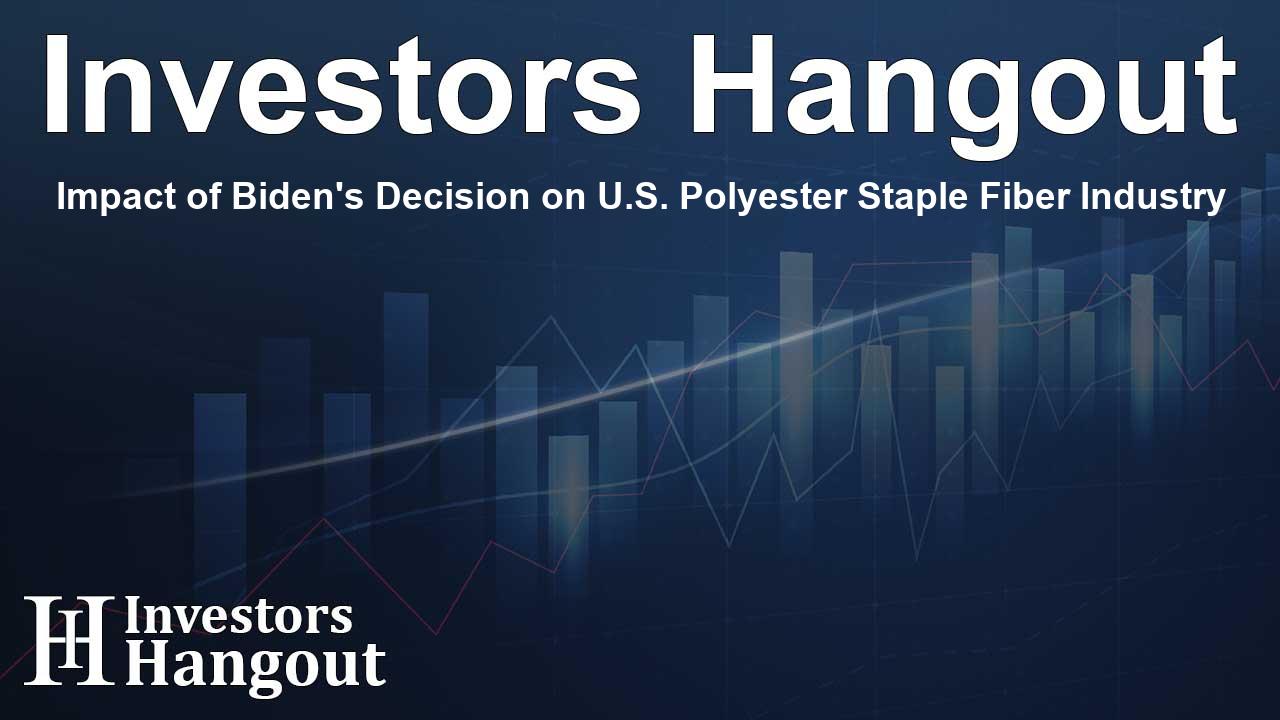Impact of Biden's Decision on U.S. Polyester Staple Fiber Industry

Impact of Biden's Decision on U.S. Polyester Staple Fiber Industry
The Biden administration's recent decision on a Section 201 trade case regarding fine denier polyester staple fiber (PSF) has stirred mixed reactions among domestic manufacturers. While the intention is to address the challenges faced by U.S. producers, many express disappointment at the perceived inadequacy of the measures taken. The ruling comes at a critical time when the industry is grappling with low-priced imports that threaten its sustainability and workforce.
Key Aspects of the Administration's Decision
The White House's decision followed an in-depth investigation by the U.S. International Trade Commission (ITC), which revealed that imports of PSF had caused serious harm to American producers. This investigation underscored a troubling trend—numerous domestic companies have either closed their doors or laid off significant numbers of employees due to market pressures from inexpensive foreign imports.
Concern Over Shortcomings in Relief Measures
One of the primary frustrations for the U.S. PSF industry is the refusal to implement stronger regulations as recommended by the ITC. Despite the finding that these imports have severely injured the domestic market, the inflection of effective measures is lacking. The industry's leaders were hoping for more robust tariffs against foreign PSF imports, which would allow them to compete more effectively in a market vulnerable to undervalued foreign products.
The Future of U.S. Manufacturing
Many manufacturers eagerly anticipated substantial support from the Biden administration. They had plans in place to invest significantly in revamping their production capabilities, with expectations of creating local jobs and revitalizing the sector. However, without the necessary trade protections, these hopes for recovery are dimming.
Understanding Polyester Staple Fiber and Its Importance
Fine denier PSF is an essential component in various products ranging from clothing to everyday household items. It is a manmade fiber that is vital in creating textiles and nonwoven products, which are used in medical supplies, hygiene products, and even military gear. The versatility of PSF underscores its significance in daily life, making the fate of domestic producers even more crucial.
The Challenges Faced by U.S. Producers
Previously, the domestic industry had experienced a lull in protection following antidumping measures introduced in 2018 against imports from countries such as China, India, South Korea, and Taiwan. However, these protective measures did not span all imports, leaving a gap for other countries to take advantage of the situation, ultimately leading to heightened market instability and loss of competitive edge for U.S. manufacturers.
Impact on Workers and Communities
The consequences of weak protections are not just economic; they affect individuals and communities directly. Workers in the PSF industry, who rely on stable jobs, face an uncertain future as companies struggle to remain operational amidst ongoing challenges. Reduced operations or factory closures have resulted in significant job losses, impacting families and small communities dependent on these manufacturing jobs. This presents a stark reminder of the importance of robust industrial policy and support for local industries.
Conclusion and Industry Outlook
As the U.S. continues to navigate complex trade issues and the evolving global market, the situation for fine denier PSF producers remains precarious. Industry leaders are calling for renewed efforts to secure relief that addresses their needs effectively, aiming to restore their competitiveness and protect the jobs of many hard-working citizens. Without such actions, the future of U.S. manufacturing in this critical sector hangs in the balance.
Frequently Asked Questions
What is fine denier polyester staple fiber (PSF)?
Fine denier PSF is a manmade fiber used in various applications, including clothing, hygiene products, and military gear. Its versatility makes it vital in multiple day-to-day products.
Why was there disappointment with the Biden administration's decision?
Many U.S. manufacturers felt that the decision did not provide adequate protection from low-priced imports, which could undermine their competitiveness and sustainability.
What previous measures had been taken to protect the U.S. PSF industry?
In 2018, antidumping and countervailing duty orders were implemented against imports from certain countries, but these protections were later bypassed by surging imports from others.
How have U.S. manufacturers responded to the current situation?
Manufacturers had planned significant investments to enhance their facilities and operations but are now reconsidering their strategies due to insufficient trade relief.
What is the outlook for the PSF industry in the U.S.?
The outlook remains uncertain as industry leaders advocate for stronger protective measures to ensure their survival and continued contribution to the economy.
About The Author
Contact Thomas Cooper privately here. Or send an email with ATTN: Thomas Cooper as the subject to contact@investorshangout.com.
About Investors Hangout
Investors Hangout is a leading online stock forum for financial discussion and learning, offering a wide range of free tools and resources. It draws in traders of all levels, who exchange market knowledge, investigate trading tactics, and keep an eye on industry developments in real time. Featuring financial articles, stock message boards, quotes, charts, company profiles, and live news updates. Through cooperative learning and a wealth of informational resources, it helps users from novices creating their first portfolios to experts honing their techniques. Join Investors Hangout today: https://investorshangout.com/
The content of this article is based on factual, publicly available information and does not represent legal, financial, or investment advice. Investors Hangout does not offer financial advice, and the author is not a licensed financial advisor. Consult a qualified advisor before making any financial or investment decisions based on this article. This article should not be considered advice to purchase, sell, or hold any securities or other investments. If any of the material provided here is inaccurate, please contact us for corrections.
